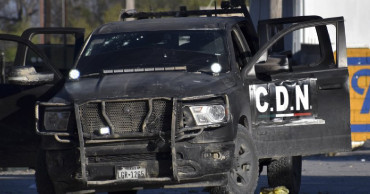US border
Mexico relocates migrants far from US border
Around 100 migrants from various countries roamed aimlessly through the streets of Acapulco, a troubled resort on Mexico’s Pacific coast.
Having trekked for weeks across southern Mexico alongside hundreds of other migrants, they agreed to immigration officials’ proposal to travel to Acapulco, expecting to continue their journey toward the U.S. border. Instead, they found themselves stranded on Monday, reports AP.
Trump threatens to impose sweeping new tariffs on Mexico, Canada and China on first day in office
With President-elect Donald Trump’s second inauguration just two weeks away, Mexico persists in breaking up high-profile migrant caravans and scattering migrants across the country to keep them away from the U.S. border and prevent their concentration in any one area.
This "dispersion and exhaustion" strategy has been a cornerstone of Mexico’s immigration policy in recent years. It has significantly reduced the number of migrants reaching the U.S. border, explained Tonatiuh Guillén, former chief of Mexico’s immigration agency, it said.
Claudia Sheinbaum to be sworn in as Mexico’s 1st female president
Guillén added that the current administration hopes the reduced migrant numbers will help counter Trump’s pressure. Guillén left the administration of former President Andrés Manuel López Obrador after Trump threatened tariffs over migration during his first term.
Acapulco, once a jewel of Mexican tourism, is an unlikely destination for migrants. The city is grappling with organized crime and is still recovering from the devastation of Hurricane Otis in 2023.
On Monday, while Mexican tourists enjoyed the final moments of their holiday beach vacations, migrants slept on the streets or sought ways to resume their northward journeys, the report said.
“Immigration officials told us they’d give us a permit to travel freely across the country for 10 to 15 days, but that didn’t happen,” said 28-year-old Venezuelan migrant Ender Antonio Castañeda. “They abandoned us here with no way to leave. They won’t sell us bus tickets or anything else.”
Castañeda, like thousands of others, had left Tapachula, a southern city near the Guatemalan border. In recent weeks, more than six caravans of about 1,500 migrants each have departed from Tapachula, but none got far.
6 die in landslide caused by heavy rains in Mexico
Authorities allow the migrants to walk for days before exhaustion sets in and then offer to transport them to various cities, promising to review their immigration status—a process with uncertain outcomes.
Some migrants have ended up in Acapulco, where about a dozen sleep at a Catholic church near immigration offices. On Monday, dozens gathered outside the offices seeking information, but no one provided answers.
Castañeda, having received money from his family and desperate to leave, opted for a ride from a van driver he deemed the most reliable, despite fares being five times higher than regular bus tickets to Mexico City.
Some migrants discovered that the permits they received restrict their travel to Guerrero state, where Acapulco is located, while others have had more luck.
On Sunday, a recent migrant caravan disbanded after hundreds received transit permits allowing unrestricted travel within Mexico for a limited time.
Cuban migrant Dayani Sánchez, 33, and her husband were among those granted such permits. “We’re a little scared about safety while traveling by bus, fearing we might be stopped,” she said. Mexican drug cartels often target migrants for extortion or kidnapping, and some migrants accuse authorities of similar practices.
President Claudia Sheinbaum has claimed that her immigration policy prioritises humanitarian concerns, allowing more migrants to leave southern Mexico. However, migration advocates have pointed out that migrants are often sent to dangerous regions.
The Rev. Leopoldo Morales, a priest at the Catholic church near the immigration offices in Acapulco, expressed similar concerns. In November, buses carrying migrants—including families—arrived in Acapulco. Last weekend, two more buses brought adult migrants.
Although Acapulco is not a traditional migration route and lacks infrastructure to support migrants, local priests have coordinated efforts to provide water, food, and clothing. “They’re in dire straits, arriving with nothing,” Morales said.
Migrants quickly realise finding work in Acapulco is nearly impossible. Following Hurricane Otis, the federal government deployed soldiers and National Guard troops to aid reconstruction and ensure security. However, the city continues to struggle with violence.
Acapulco remains one of Mexico’s most violent cities, with high homicide rates. Local cab drivers and small business owners—who spoke anonymously—reported rising extortion, deterring large businesses from rebuilding.
Honduran migrant Jorge Neftalí Alvarenga, relieved to have left Chiapas near the Guatemalan border, was already disillusioned.
“They misled us,” Alvarenga said. “We asked for arrangements to take us to Mexico City for work or even places like Monterrey, where there are more job opportunities.”
1 year ago
New US border enforcement actions pose risk to fundamental human rights: Türk
New border enforcement measures recently announced by the US administration risk undermining the basic foundations of international human rights and refugee law, UN High Commissioner for Human Rights Volker Türk said Wednesday.
“The right to seek asylum is a human right, no matter a person’s origin, immigration status, nor how they arrived at an international border,” said Türk.
“These measures appear to be at variance with the prohibition of collective expulsion and the principle of non-refoulement,” the UN human rights chief said.
The announced changes include increased use of expedited removals and expansion of the use of the Title 42 public health order to permit the fast-track expulsion to Mexico of some 30,000 Venezuelans, Haitians, Cubans and Nicaraguans each month.
Read more: US border cities strained ahead of expected migrant surge
Title 42 has already been used by US immigration officials some 2.5 million times at the southern border to expel people to Mexico or their home country without an individualised assessment of all their protection needs accompanied by due process and procedural safeguards.
At the same time, a “humanitarian parole” programme, which was previously extended to Venezuelans, would be expanded to include nationals of Cuba, Haiti and Nicaragua, allowing some 30,000 individuals per month from these four countries to come to the US for a limited period of two years with strict conditions for eligibility.
“While I welcome measures to create and expand safe and regular pathways, such initiatives should not come at the expense of fundamental human rights, including the right to seek asylum and the right to an individual assessment of protection needs. Limited access to humanitarian parole for some cannot be a replacement for upholding the rights of all to seek the protection of their human rights,” Türk said.
The high commissioner also said those most in need of asylum and those in vulnerable situations are unlikely to meet the restrictive requirements to be granted humanitarian parole, including having a financial sponsor in the US.
“We hear a great deal of talk about migration crises, but in reality, it is those migrating who often are the ones truly in crisis. Rather than vilifying them and stripping them of long-recognised rights, we should be seeking to govern migration humanely and safely with full respect for the human rights of every individual,” he added.
Read more: Illegal border crossings to US from Mexico reach annual high
3 years ago
US to reopen land borders in November for fully vaccinated
The U.S. will reopen its land borders to nonessential travel next month, ending a 19-month freeze due to the COVID-19 pandemic as the country moves to require all international visitors to be vaccinated against the coronavirus.
Vehicle, rail and ferry travel between the U.S. and Canada and Mexico has been largely restricted to essential travel, such as trade, since the earliest days of the pandemic. The new rules, to be announced Wednesday, will allow fully vaccinated foreign nationals to enter the U.S. regardless of the reason for travel starting in early November, when a similar easing of restrictions is set to kick in for air travel into the country. By mid-January, even essential travelers seeking to enter the U.S., like truck drivers, will need to be fully vaccinated.
Senior administration officials previewed the new policy late Tuesday on the condition of anonymity to speak ahead of the formal announcement.
Also read: Central American migrants debate route to US border, options
Both Mexico and Canada have pressed the U.S. for months to ease restrictions on travel that have separated families and curtailed leisure trips since the onset of the pandemic. The latest move follows last month’s announcement that the U.S. will end country-based travel bans for air travel, and instead require vaccination for foreign nationals seeking to enter by plane.
Both policies will take effect in early November, the officials said. They did not specify a particular date.
The new rules only apply to legal entry to the U.S. Officials cautioned that those seeking to enter illegally will still be subject to expulsion under so-called Title 42 authority, first invoked by former President Donald Trump, that has drawn criticism from immigration advocates for swiftly removing migrants before they can seek asylum. One of the officials said the U.S. was continuing the policy because cramped conditions in border patrol facilities pose a COVID-19 threat.
According to the officials, travelers entering the U.S. by vehicle, rail and ferry will be asked about their vaccination status as part of the standard U.S. Customs and Border Protection admissions process. At officers’ discretion, travelers will have their proof of vaccination verified in a secondary screening process.
Also read: Coronavirus: Canada, US extend border restrictions for 1 more month
Unlike air travel, for which proof of a negative COVID-19 test is required before boarding a flight to enter the U.S., no testing will be required to enter the U.S. by land or sea, provided the travelers meet the vaccination requirement.
According to the Centers for Disease Control and Prevention, the U.S. will accept travelers who have been fully vaccinated with any of the vaccines approved for emergency use by the World Health Organization, not just those in use in the U.S. That means that the AstraZeneca vaccine, widely used in Canada, will be accepted.
Officials said the CDC was still working to formalize procedures for admitting those who received doses of two different vaccines, as was fairly common in Canada.
The delay in the vaccination requirement for essential cross-border travel is meant to provide truck drivers and others with additional time to get a shot and minimize potential economic disruption from the vaccination mandate, officials said.
All told, the new procedures move toward a policy based on the risk profiles of individuals, rather than less targeted country-based bans.
The vaccination requirement for foreign nationals comes as the White House has moved to impose sweeping vaccination-or-testing requirements affecting as many as 100 million people in the U.S. in an effort to encourage holdouts to get shots.
On Tuesday, the U.S. Department of Labor completed the initial draft of an emergency regulation that will require employers of 100 workers or more to demand their employees be vaccinated against COVID-19 or tested weekly. The Office of Management and Budget is now reviewing the order before its implementation.
Mexico has not put in place any COVID-19 entry procedures for travelers. Canada allows entry of fully-vaccinated individuals with proof of vaccination against COVID-19 as well as proof of a negative test conducted within 72 hours of entry to the country.
4 years ago
Death toll put at 20 for Mexico cartel attack near US border
Mexican security forces on Sunday killed seven more members of a presumed cartel assault force that rolled into a town near the Texas border and staged an hour-long attack, officials said, putting the overall death toll at 20.
6 years ago


.jpg)



